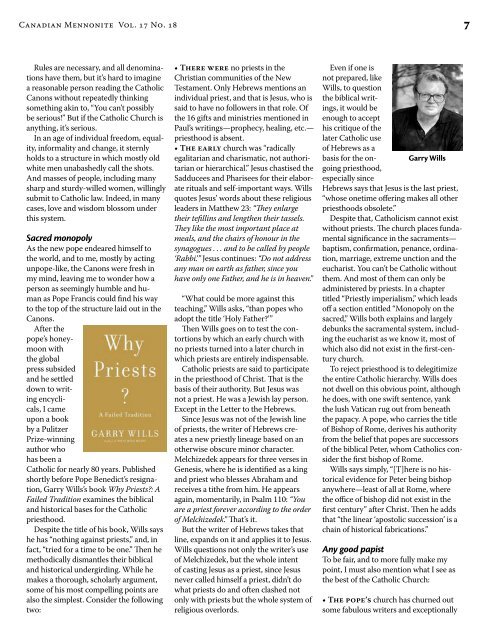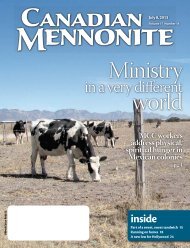Create successful ePaper yourself
Turn your PDF publications into a flip-book with our unique Google optimized e-Paper software.
<strong>Canadian</strong> <strong>Mennonite</strong> Vol. 17 No. 187Rules are necessary, and all denominationshave them, but it’s hard to imaginea reasonable person reading the CatholicCanons without repeatedly thinkingsomething akin to, “You can’t possiblybe serious!” But if the Catholic Church isanything, it’s serious.In an age of individual freedom, equality,informality and change, it sternlyholds to a structure in which mostly oldwhite men unabashedly call the shots.And masses of people, including manysharp and sturdy-willed women, willinglysubmit to Catholic law. Indeed, in manycases, love and wisdom blossom underthis system.Sacred monopolyAs the new pope endeared himself tothe world, and to me, mostly by actingunpope-like, the Canons were fresh inmy mind, leaving me to wonder how aperson as seemingly humble and humanas Pope Francis could find his wayto the top of the structure laid out in theCanons.After thepope’s honeymoonwiththe globalpress subsidedand he settleddown to writingencyclicals,I cameupon a bookby a PulitzerPrize-winningauthor whohas been aCatholic for nearly 80 years. Publishedshortly before Pope Benedict’s resignation,Garry Wills’s book Why Priests?: AFailed Tradition examines the biblicaland historical bases for the Catholicpriesthood.Despite the title of his book, Wills sayshe has “nothing against priests,” and, infact, “tried for a time to be one.” Then hemethodically dismantles their biblicaland historical undergirding. While hemakes a thorough, scholarly argument,some of his most compelling points arealso the simplest. Consider the followingtwo:• There were no priests in theChristian communities of the NewTestament. Only Hebrews mentions anindividual priest, and that is Jesus, who issaid to have no followers in that role. Ofthe 16 gifts and ministries mentioned inPaul’s writings—prophecy, healing, etc.—priesthood is absent.• The early church was “radicallyegalitarian and charismatic, not authoritarianor hierarchical.” Jesus chastised theSadducees and Pharisees for their elaboraterituals and self-important ways. Willsquotes Jesus’ words about these religiousleaders in Matthew 23: “They enlargetheir tefillins and lengthen their tassels.They like the most important place atmeals, and the chairs of honour in thesynagogues . . . and to be called by people‘Rabbi.’ ” Jesus continues: “Do not addressany man on earth as father, since youhave only one Father, and he is in heaven.”“What could be more against thisteaching,” Wills asks, “than popes whoadopt the title ‘Holy Father?’ ”Then Wills goes on to test the contortionsby which an early church withno priests turned into a later church inwhich priests are entirely indispensable.Catholic priests are said to participatein the priesthood of Christ. That is thebasis of their authority. But Jesus wasnot a priest. He was a Jewish lay person.Except in the Letter to the Hebrews.Since Jesus was not of the Jewish lineof priests, the writer of Hebrews createsa new priestly lineage based on anotherwise obscure minor character.Melchizedek appears for three verses inGenesis, where he is identified as a kingand priest who blesses Abraham andreceives a tithe from him. He appearsagain, momentarily, in Psalm 110: “Youare a priest forever according to the orderof Melchizedek.” That’s it.But the writer of Hebrews takes thatline, expands on it and applies it to Jesus.Wills questions not only the writer’s useof Melchizedek, but the whole intentof casting Jesus as a priest, since Jesusnever called himself a priest, didn’t dowhat priests do and often clashed notonly with priests but the whole system ofreligious overlords.Even if one isnot prepared, likeWills, to questionthe biblical writings,it would beenough to accepthis critique of thelater Catholic useof Hebrews as abasis for the ongoingpriesthood,Garry Willsespecially sinceHebrews says that Jesus is the last priest,“whose onetime offering makes all otherpriesthoods obsolete.”Despite that, Catholicism cannot existwithout priests. The church places fundamentalsignificance in the sacraments—baptism, confirmation, penance, ordination,marriage, extreme unction and theeucharist. You can’t be Catholic withoutthem. And most of them can only beadministered by priests. In a chaptertitled “Priestly imperialism,” which leadsoff a section entitled “Monopoly on thesacred,” Wills both explains and largelydebunks the sacramental system, includingthe eucharist as we know it, most ofwhich also did not exist in the first-centurychurch.To reject priesthood is to delegitimizethe entire Catholic hierarchy. Wills doesnot dwell on this obvious point, althoughhe does, with one swift sentence, yankthe lush Vatican rug out from beneaththe papacy. A pope, who carries the titleof Bishop of Rome, derives his authorityfrom the belief that popes are successorsof the biblical Peter, whom Catholics considerthe first bishop of Rome.Wills says simply, “[T]here is no historicalevidence for Peter being bishopanywhere—least of all at Rome, wherethe office of bishop did not exist in thefirst century” after Christ. Then he addsthat “the linear ‘apostolic succession’ is achain of historical fabrications.”Any good papistTo be fair, and to more fully make mypoint, I must also mention what I see asthe best of the Catholic Church:• The pope’s church has churned outsome fabulous writers and exceptionally




